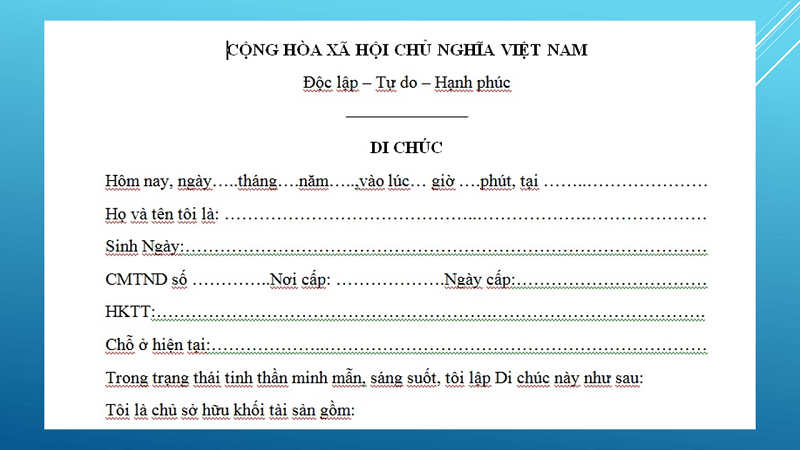The process of making a will is simple and straightforward, and if you’re interested in learning more about it, read on!
1. Detailed and concise will-making procedures
A will can be made in various forms, including a witnessed or unwitnessed written document, a notarized will, or an oral will.
Making a Written Will
When making a written will, the following conditions must be met:
– The content of the will should include the date, the full name and address of the testator (the person making the will), the full name and address of the beneficiary (the person receiving the inheritance), a description of the inheritance, and any other relevant information.
– The will must be written in full, with no abbreviations or symbols.
– Each page of the will must be numbered and bear the signature or thumbprint of the testator.
– If there are any corrections or amendments, the testator must sign next to the changes.
 Content of the will
Content of the will
Depending on the format chosen, the procedure for making a written will may vary. The specific procedures for each type of written will are as follows:
Unwitnessed Written Will
In addition to meeting the general requirements for making a written will mentioned above, the testator must write and sign the will themselves.
 Unwitnessed written will
Unwitnessed written will
Notarized or Certified Will
The process of making a notarized or certified will typically involves four steps:
Step 1: Prepare the necessary documents
This includes a request form for notarization at the office or outside the office, a draft of the will, identification documents such as a citizen ID card or passport, household registration book, marriage certificate (if applicable), and proof of ownership of the assets.
Step 2: Submit the documents
Submit the documents to the authorized agency, such as the People’s Committee at the communal level or a notary public office.
Note: In cases where the will involves real estate, the testator can have the will notarized outside the province or city where the notary office is located, as per Article 42 of the 2014 Law on Notarization.
Step 3: Notarize or certify the will
The notary public or the civil status officer will receive and review the documents and record the wishes of the testator. After explaining the rights and obligations and confirming the will, the testator will be guided to sign or thumbprint the document. The authorized person will then sign to confirm the witnesses and return the original document to the testator.
Step 4: Pay the fees
According to Decision 1024/QD-BTP and Circular 257/2016/TT-BTC, the fee for certifying a will at the People’s Committee at the communal level or a notary office is 50,000 VND. The fee for storing a will is 100,000 VND, as per Clause 4, Article 4 of Circular 256. The notary fee may vary and is subject to agreement between the notary office and the testator, but it should not exceed the fee set by the provincial People’s Committee.
 Notarized or certified will
Notarized or certified will
Witnessed Written Will
If the testator is unable to write the will themselves, they may ask someone else to write it for them, provided that there are at least two witnesses present. The testator must sign or thumbprint the will in the presence of these witnesses, who must then confirm the signature or thumbprint and sign the will themselves.
 Witnessed written will
Witnessed written will
Making an Oral Will
An oral will is made when the testator is facing imminent death and is unable to make a written will.
 Oral will
Oral will
The testator’s final wishes must be witnessed by at least two people, who will record the wishes and sign or thumbprint the will. The oral will must be notarized or certified within five days, or it will become invalid. Additionally, if the testator remains healthy and of sound mind for three months after making the oral will, the will shall be considered null and void.
2. Frequently Asked Questions
Do only sane and lucid individuals have the right to make a will?
According to Article 625 of the 2015 Civil Code, individuals have the right to make a will to dispose of their property. However, to prevent coercion, deception, or fraud, the following conditions must be met:
– For adults: The individual must be of sound mind and lucid when making the will, and there must be no coercion, deception, or fraud involved.
– For minors aged 15 to under 18: The consent of the parents or guardian is required for making a will.
 Requirements for making a will
Requirements for making a will
Is notarization or certification of a will mandatory?
The testator has the right to choose the heir(s), appoint a representative to receive the inheritance on behalf of the heir(s), and clearly divide the inheritance among the designated heirs (as per Article 626 of the 2015 Civil Code).
 Notarization or certification of a will
Notarization or certification of a will
If the will is deemed illegal, the inheritance will still be divided according to the law.
A will must be made in writing, but if that is not possible, an oral will can be made:
– Written will: This can be made with or without witnesses, or with notarization and certification.
– Oral will: Notarization or certification is not always mandatory. However, it is required in certain cases, such as for oral wills, wills made by illiterate individuals, wills made by physically limited individuals, and wills made in a foreign language.
What are the conditions for making a valid will?
– The testator must be of sound mind and lucid during the will-making process.
– There must be no coercion, force, or deception involved.
– The content of the will must comply with the law and not violate any legal provisions.
– The form of the will must comply with legal requirements: it must be in writing or, if not, made orally.
 Valid will requirements
Valid will requirements
Can minors under 18 make a will?
Minors aged 15 to under 18 can make a will with the consent of their parents or guardian.
What are the requirements for the beneficiary of a will?
 Beneficiary requirements
Beneficiary requirements
The beneficiary must be alive at the time of the opening of the succession or must have been conceived before the death of the testator. If the beneficiary is not an individual, they must exist at the time of the opening of the succession.
That’s all the information we have gathered! Thank you for reading.
Further Reading:
>>
>>
>>
































